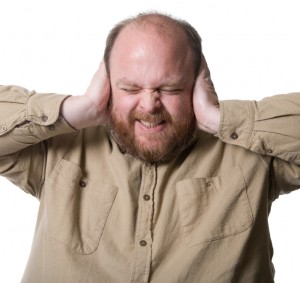What is Tinnitus?
- TINN-i-tus or tinn-I-tus

- Sounds in the ears not generated from an external source and not heard by others
Tinnitus is commonly known as “ringing in the ears.” However, it takes many other forms, such as:
- Pulsating/Constant vs Varying/Staccato
- Electric Wire Buzzing
- Whistling (Tea Kettle)
- Ringing/Crickets
- Roaring vacuum cleaner
- Combo Noise
Samples of some of these sounds can be heard on this UK site.
How Prevalent is Tinnitus?
- 30-50 million Americans have tinnitus
- Of those, 1 in 5 has such extreme symptoms that their quality of life is severely affected
- Annually, 12 million seek medical help
- Tinnitus is the #1 disability among veterans
What causes Tinnitus?
Tinnitus is caused by some kind of damage or hearing loss that has wiped out some of the little fibers in the ears that deliver sound to the hearing mechanism. In an attempt to be helpful, the brain begins to try to “fill in” the missing areas by creating sounds in the wave section that has been damaged.
Most common (90%) cause: Prolonged exposure to loud sounds
- Carpenters or Construction Workers
- Pilots or Airline Mechanics
- Rock Musicians or Concert Goers
- Street Repair Workers
- Landscapers
- Military
Other causes:
- Ear infection, disease or wax
- Side effect of 200+ drugs
- Diseases/disorders (high blood pressure, allergies, cardiovascular, anemia, diabetes, etc)
- TMJ or head/neck injury
What causes SUFFERING from Tinnitus?
- Millions of people have Tinnitus but do not suffer to the degree of others
- In addition to a possibly greater extent of hearing damage, sufferers tend to be:
- Perfectionistic
- Obsessive
- Highly Anxious
- Driven
What is the Prognosis and Outcome of Tinnitus?
- Depends on cause and severity of condition
- Tinnitus may abate as person “habituates” to sound and learns to ignore it
- Tinnitus may be so intense that it leads to disability
- Tinnitus causes and/or exacerbates anxiety and depression
- Tinnitus affects family relationships
- Tinnitus can lead to suicidal behavior
How is Tinnitus Treated?
If you go to an audiologist who says, “There is no cure for Tinnitus – you just have to live with it,” or a physician who says, “There’s nothing you can do — here’s a prescription for an antidepressant or anti-anxiety pill,” I would recommend you dump those doctors and go find someone more enlightened!
While it is true that there is CURRENTLY no 100% cure, there are plenty of tools and techniques that can help you with this condition, and ongoing research may very well eventually lead to a cure, at least for some people.
Audiology Interventions for Tinnitus
You can use fans, background music, white or pink or brown noise generators, or nature sounds in your home or office to “wash-out” the ringing or other annoying sounds.
Audiologists can fit you with a sound device that is specifically calibrated to provide the missing pieces in your hearing range, overlaid with gentle music that helps your brain to relax and allow your hearing to readjust itself.
- TRT (Tinnitus Retraining Therapy)
- Neuromonics (TM)
- Widex Zen Program (TM)
- Other Sound-Generating Devices (MP3 player, iPod)
Stress Reduction Techniques for Tinnitus
There are also a number of stress-reducing approaches: yoga, meditation, relaxation breathing, guided visualization, etc.
Cognitive Behavioral Therapy for Tinnitus
- Research indicates that Cognitive Behavioral Therapy is the most generally successful approach to treatment of tinnitus
- Either independent CBT sessions, or in conjunction with audiological devices such as Neuromonics or TRT
- CBT can teach you how to ignore the noises, so that even if they never actually go away, you can learn to pay little or no attention to them.
